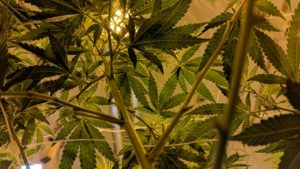The Effects of Marijuana on Fertility

In 1996, California was the first state to legalize medical marijuana, sparking a trend that now includes 36 states. Colorado and Washington became the first of 16 states to legalize recreational cannabis. Currently, pot is the most widely consumed semi-legal recreational drug in the western world with an estimated 250 million users, including 1 in 7 Americans who use it regularly. If you don’t believe these numbers, walk outside in Amsterdam or San Francisco and take a deep breath.
Weed Worries
Despite its widespread legality and its reputation as an inoffensive and relaxing habit, we know little about pot’s negative health effects. However, a body of evidence now suggests that pot is not good for male fertility. The active component of marijuana is Δ9-tetrahydrocannabiol (THC), which has receptors in both the brain and the testes. That means that similar to the brain, the testicles also “see” pot. However, we know very little about how it affects the testicles. From my reading of the literature, I feel that the effect of pot on male fertility puts tobacco to shame.
Sperm and Pot in a Dish
Here’s why. Laboratory studies of THC-exposed sperm show pretty impressive findings. For one, it’s clear that sperm see the THC and other substances found in pot. Similar to well-known pot-induced mood alternations, sperm from weed users also behave abnormally. Essentially, in the race to fertilize the egg, pot makes sperm sprint too early and then “burn out” quicker. Sperm exposed to THC also show changes in their enzyme-filled caps. So, pot-laden sperm might have more trouble not only reaching the egg after sex but also, even if they find the egg, fertilizing it. A real “high” at the sperm level.
Sperm and Pot in the Body
And real-world studies support these scientific findings. In a Danish study of 1,215 men who used pot more than once weekly, they had 28% less sperm. When weed was combined with other recreational drugs, sperm counts fell even lower, approaching 50%. Other studies have shown that regular marijuana use is linked with abnormal sperm shape, altered sperm epigenetics, higher rates of oxidative stress and an increased rate (twofold) of miscarriages among partners. Importantly, prospective studies of pot’s effects on actual fertility among couples trying to conceive have not yet been performed. But, there is little doubt that pot effects the way sperm look, the way they move and the way they act, which can’t be good for that intense race to the egg that has been around for millions of years.
My concerns about pot’s health effects are also based on the widely held notion that it is less harmful than tobacco, when in fact it may not be. One big difference here is the fact that reversibility of pot’s effect on sperm is more drawn out than tobacco since THC hangs around in body fat for as long as a month after regular use. And, edible pot is probably worse than smoked weed. This is because smoking marijuana gives a more intense “high” than eating it. This leads to higher consumption rates of edible pot to produce a similar “high” and therefore higher doses of THC in the body. Now is the time to stop believing that pot is harmless to reproductive health!
What About CBD?
CBD, which stands for cannabidiol, is a naturally occurring chemical in marijuana and hemp plants. It can be used or consumed in many forms, including edible gummies, creams, lotions, oils and tinctures.
Unlike THC, CBD does not provide a “high.” However, many claims have been made about CBD’s effectiveness in treating ailments such as anxiety, depression, insomnia, post-traumatic stress disorder and chronic pain.
Considering CBD’s supposed benefits and availability, it is understandable that many couples are interested to know whether CBD affects fertility and conception. Unfortunately, CBD has not received enough research on this, so these questions remain unanswered. We simply don’t know.
Until studies take a hard look at the impact of CBD use, it’s probably best to abstain if you are trying to conceive.









